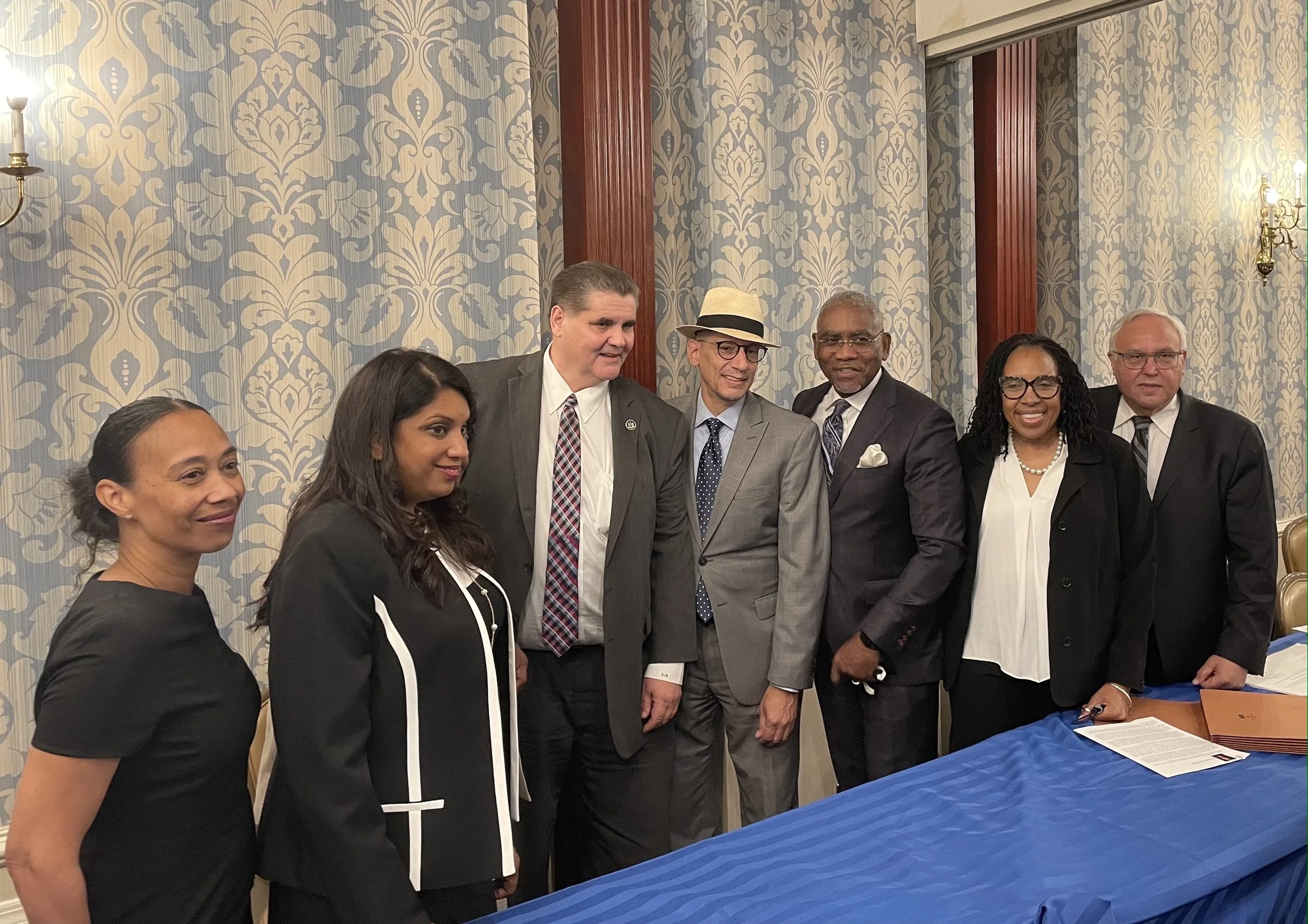QCBA issues judicial candidate ratings
/Supreme Court Judicial Candidates Michele Titus, Karen Gopee, Denis Butler, David Kirschner and Larentina McKetney Butler, with Rep. Gregory Meeks and attorney Michael Reich. Eagle file photo by Jacob Kaye
By Jacob Kaye
The Judiciary Committee of the Queens County Bar Association released its ratings of judicial candidates running in the upcoming general election.
The bar association – much like the New York City Bar Association – doesn’t share the precise methodology behind the ratings. Unlike the City Bar, the QCBA uses three ratings, as opposed to two – “well qualified,” “qualified,” and “not qualified.”
Of the 12 candidates rated by the QCBA’s committee, only one – Republican nominee for Queens Supreme Court John C. Spataro – was deemed not qualified.
Candidates Denis J. Butler, who is running for a second term in the Supreme Court, Cassandra Johnson, who is running for a spot on the New York City Civil Court Queens, 4th Municipal Court District bench, and Paul Vallone, who is running New York City Civil Court Queens, 3rd Municipal Court District, were all deemed well qualified.
Supreme Court candidates Larentina McKetney Butler, Karen Gopee, David Kirschner, Joseph F. Kasper and Kenneth Holder, who is running for a second term, were given a qualified rating. Countywide Civil Court candidates Andrea Ogle and William D. Shanahan were also said to be qualified by the committee.
The QCBA’s ratings didn’t vary drastically from the NYCBA’s list, however the two organizations did rate some candidates differently.
Kirschner, who currently serves in the Bronx Criminal Court, was not approved by the NYCBA but approved by the QCBA.
There were also several candidates running for a judicial seat who were not rated by the Queens bar and didn’t participate in the process, including Working Families Party nominees for the Supreme Court Deborah Axt and Bob Cohen, Republican nominee to the Civil Court, 4th Municipal District Daniel Kogan, Democratic nominee to the Supreme Court Michele Titus and Countywide Civil Court nominee Soma Syed.
All candidates were not approved by the NYCBA, though the rating could be applied if a candidate does not participate in the process.
“The members of the Judiciary Committee for the New York City Bar, and the Queens County Bar are attorneys in practice for a long period of time,” said QCBA President Frank Bruno. “They have courtroom experience, they’re able to observe and determine judicial acumen, tone and temperament and the members of the committee that are participants in that judicial inquiry are in the best position to make the judgment.”
The process delves deep into the backgrounds and workings of judicial nominees, said Les Nizen, the chair of the Judicial Committee.
Most of the process is done in conjunction with the NCYBA, though the individual evaluations of candidates are done separately.
Candidates are first required to fill out a “very detailed and lengthy application,” Nizen said. Several members of the committee will review each candidate’s written work, interview attorneys who have worked in the past with the candidate and, when possible, observe the candidate in a courtroom setting.
The committee members then create a report on each candidate and submit them to the rest of the joint committee. Then, the candidates are interviewed.
The two bar association’s split for the final step in the process – the vote.
The QCBA committee votes by secret ballot.
Nizen said the ratings have multiple benefits – to voters, candidates and attorneys in the bar associations.
“If I'm a candidate, and I'm being reviewed,my peers are the people that know me or have appeared before me and I would like to know what their perception of me is,” Nizen said. “If I think I'm a very kind and sweet jurist, but the people that appear before me think I'm an SOB, I would like to know that so that I can make amends and change.”
It’s also beneficial to the attorneys who review candidates, Nizen said, because it gives them some agency in the process and allows them to arm their colleagues with information that they can take to the voting booth.
Lastly, voters get an independent analysis of the candidates they’ll be casting ballots for. Judicial campaigns often give less insight into a candidate than campaigns for other public offices.
Additionally, judicial candidates are chosen by political parties – Supreme Court nominees don’t have a primary at all, and are instead nominated by parties to run in the general election.
“If people are not voting by party lines, it has some impact,” Nizen said.
In the past, the QCBA’s Judicial Committee, which Nizen has served on for around two decades, was involved in the candidate review process prior to the parties making their nominations. It’s a process, he wishes, may one day return.
“Perhaps someday, that could happen again but that's a political situation that the district leaders or the party leaders would have to agree with,” he said.




